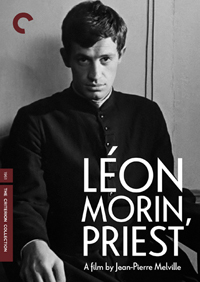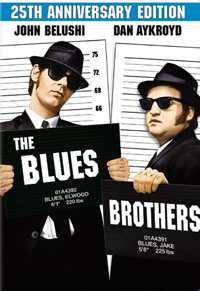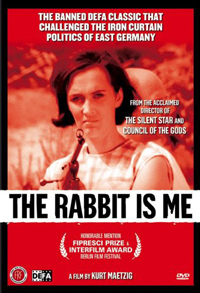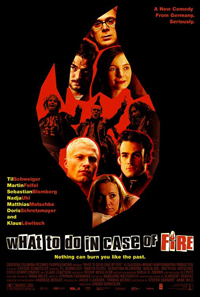Movies We Like
Handpicked By The Amoeba Staff
Films selected and reviewed by discerning movie buffs, television junkies, and documentary diehards (a.k.a. our staff).
Léon Morin, Priest
 Theism has always been a dominating and polarizing subject in philosophy. For the late philosophers who were atheists, their argument against God's existence often clashed with the popular arguments of reason that suggest we all have a soul. The question of whether or not this soul needs salvation cannot ever be answered. Léon Morin, Priest has a character that goes as far as to suggest the need for uncertainty in religion. Without it, the priest claims, there wouldn't be a cause for faith. As in love, he compares devotion to God as merely a “leap of faith”--a belief held by many theists and philosophers. But for Barny, his latest attempt at conversion, one cannot compare the loves of the flesh with that of a Holy spirit.
Theism has always been a dominating and polarizing subject in philosophy. For the late philosophers who were atheists, their argument against God's existence often clashed with the popular arguments of reason that suggest we all have a soul. The question of whether or not this soul needs salvation cannot ever be answered. Léon Morin, Priest has a character that goes as far as to suggest the need for uncertainty in religion. Without it, the priest claims, there wouldn't be a cause for faith. As in love, he compares devotion to God as merely a “leap of faith”--a belief held by many theists and philosophers. But for Barny, his latest attempt at conversion, one cannot compare the loves of the flesh with that of a Holy spirit.
Following the Italian occupation in France during WWII, a small village is now met with the hostility of Nazi Germany. As the German troops move in to capture and deport Jews, many townspeople scuffle to prove their allegiance to Christ. Children are given hasty baptisms in large numbers and the widows of men lost in battle try desperately to stay true to France while deceiving the Nazi regime. Barny (Emmanuelle Riva) is one of these women. Husbandless and with a young daughter, she decides to visit the Catholic church to seek advice. Though she's an atheist, the village leaves no other options in charitable good will. Of the two priests available to speak to she chooses Léon Morin (Jean-Paul Belmondo), a 26-year old man from a modest family. She expects to be met by a man who blindly lays claim to God but is surprised at his complex outlook on faith and his willingness to tolerate her absence of it.
The Blues Brothers
 There was a time in 1978 when John Belushi had the number one movie in theaters— National Lampoon’s Animal House. He also starred on the massively popular Saturday Night Live and his band The Blues Brothers, a group he co-fronted along with SNL co-star Dan Aykroyd, had the number one album in the country. The success of their album Briefcase Full of Blues led to a film adaptation, The Blues Brothers—the first and still the best of many films to originate from SNL skits. It’s a loud musical-action-comedy film that works in all three genres while boasting some great car chases, stellar music, and staying very funny throughout.
There was a time in 1978 when John Belushi had the number one movie in theaters— National Lampoon’s Animal House. He also starred on the massively popular Saturday Night Live and his band The Blues Brothers, a group he co-fronted along with SNL co-star Dan Aykroyd, had the number one album in the country. The success of their album Briefcase Full of Blues led to a film adaptation, The Blues Brothers—the first and still the best of many films to originate from SNL skits. It’s a loud musical-action-comedy film that works in all three genres while boasting some great car chases, stellar music, and staying very funny throughout.
Fresh from a stint in prison Jake (Belushi) reunites with his brother Elwood (Aykroyd). Spurred on by an old friend, Curtis (Cab Calloway) they visit their childhood orphanage and learn that it’s on the verge of being shut down for owing back taxes. After a vision “from God” in church they decide to reform their old blues band and raise money with a large charity concert. Most of their bandmates have contempt for them and need convincing to reunite. Along the way they tend to wreak havoc and leave large swaths of destruction wherever they go which leads the police after them. They also create foes with a country/western band, The Good Ol' Boys (led by Charles Napier), when The Blues Brothers steal their bar gig. They disrupt a Nazi rally and manage to put a carload of uniformed Nazis on their trail (led by the hilarious Henry Gibson of Nashville). Oh, and Jake’s jilted lover ( played by Carrie Fisher) attacks them with machine guns and flame torches whenever she is able to catch up with them.
In China They Eat Dogs
 Arvid (Dejan Cukic) is a pushover who can't seem to find his way in life. He works at a bank and lives with his girlfriend, Hanne. The two get into an argument over breakfast because Arvid donated 800 crowns to a church fund—money that Hanne wanted to use for shopping. As he tries to move past the dispute unscathed she makes him out to be a boring purist who's trying to save the world.
Arvid (Dejan Cukic) is a pushover who can't seem to find his way in life. He works at a bank and lives with his girlfriend, Hanne. The two get into an argument over breakfast because Arvid donated 800 crowns to a church fund—money that Hanne wanted to use for shopping. As he tries to move past the dispute unscathed she makes him out to be a boring purist who's trying to save the world.
We then jump to Richard (Lester Wiese), a traveling American who settles into a seat at a bar and has a mysterious meeting with Arvid at noon. The bartender and a patron start to chat with him. With two hours to spare until Arvid's arrival, he recaps the recent series of events that have put Arvid in a delicate situation—a man who up until 12 days prior Richard had never heard of.
The Rabbit is Me
 With films that have been or are currently banned in their country of origin comes an instant intrigue in me. Apparently this film was banned for “exposing the harsh realities of East German society,” but that statement, seen on the back of the DVD cover, is a little ambiguous. While watching the film you do get a vague understanding of the politics and lack of justice in the judicial system of 1960s Germany; you begin to understand that the film's “anti-socialist” message could have come as a great threat. However, there is a lot left unexplained—a lot that you have to go and research on your own, and that's not necessarily a bad thing. Somehow you don't mind being led into a haze because the film's heroine, a blacklisted 19-year old, is an astounding portrait of the system's failure. Her will to overcome the setbacks of an “opportunist” and unjust society gives you hope. It's that hope of something better and more democratic that could have been contagious, and was therefore silenced. Still, The Rabbit is Me is hailed as one of the most important New Wave films to come out of Germany.
With films that have been or are currently banned in their country of origin comes an instant intrigue in me. Apparently this film was banned for “exposing the harsh realities of East German society,” but that statement, seen on the back of the DVD cover, is a little ambiguous. While watching the film you do get a vague understanding of the politics and lack of justice in the judicial system of 1960s Germany; you begin to understand that the film's “anti-socialist” message could have come as a great threat. However, there is a lot left unexplained—a lot that you have to go and research on your own, and that's not necessarily a bad thing. Somehow you don't mind being led into a haze because the film's heroine, a blacklisted 19-year old, is an astounding portrait of the system's failure. Her will to overcome the setbacks of an “opportunist” and unjust society gives you hope. It's that hope of something better and more democratic that could have been contagious, and was therefore silenced. Still, The Rabbit is Me is hailed as one of the most important New Wave films to come out of Germany.
In the film we find a 17-year old Maria (Angelika Waller) at the end of her high school education. Like all of her peers, she's exceptionally bright and a strong-willed young lady. She and her brother are orphans who live with their aunt (Ilse Voigt), and just before graduation, two officers come calling. They inform the broken family that their brother/nephew, Dieter (Wolfgang Winkler), is being charged with inciting subversive material, which could lead to a 3-year prison sentence. They try to appear at his trial but are removed on questionable grounds from the courtroom. Young Dieter loses the trial. Before being locked up he's able to see his family, and he warns his sister to be wary of two people. The prosecutor and the judge who put him away, Paul Deister.
What to Do in Case of Fire
 Tangents are something I try to avoid, but this film brought to mind a certain phenomenon that helped me relate to and understand its energy. When a person gets their first tattoo or piercing, especially when they're young, they'll often be met with a patronizing lecture from an elder. The question, “Do you want that on your skin when you're old?” is usually the first of the interrogation, the second being, “Is what the tattoo means really that important?” Like many youngsters, I got my first tattoo and felt marked and personalized at the time. I was an individual who saw herself devoted to certain things; I wanted to carry them with me always. A few years passed and I became less outspoken and devoted to other things. By early adulthood, my piercings had been removed, my hair was no longer tousled and my subversive literature was donated to the Goodwill. There wasn't a loathing for the tattoos—the only thing I couldn't get rid of and the only thing linking me to my past self. The feeling towards them was more fascination. I learned to wear the markings with pride, though it had nothing to do with the symbols or what they represented. They have crystallized many feelings that I used to have; aggression, radicalism, passion, and overpowering self-love. I look at them to be reminded of that.
Tangents are something I try to avoid, but this film brought to mind a certain phenomenon that helped me relate to and understand its energy. When a person gets their first tattoo or piercing, especially when they're young, they'll often be met with a patronizing lecture from an elder. The question, “Do you want that on your skin when you're old?” is usually the first of the interrogation, the second being, “Is what the tattoo means really that important?” Like many youngsters, I got my first tattoo and felt marked and personalized at the time. I was an individual who saw herself devoted to certain things; I wanted to carry them with me always. A few years passed and I became less outspoken and devoted to other things. By early adulthood, my piercings had been removed, my hair was no longer tousled and my subversive literature was donated to the Goodwill. There wasn't a loathing for the tattoos—the only thing I couldn't get rid of and the only thing linking me to my past self. The feeling towards them was more fascination. I learned to wear the markings with pride, though it had nothing to do with the symbols or what they represented. They have crystallized many feelings that I used to have; aggression, radicalism, passion, and overpowering self-love. I look at them to be reminded of that.
What to Do in Case of Fire is the story of punk anarchists who grew up and, for the most part, carried on lives that would have been considered "selling out" in their youth. The year was 1987, and a group of young people were fed up with their unsuccessful riots and the obscurity of their homemade propaganda films. They decided to make one final film, How to Make a Homemade Bomb, and, using chemicals, feces, and a cooking pan, they tell their non-existent audience how to assemble the bomb, dispose of the evidence and leave it in an abandoned building. The bomb didn't go off, though.
Butch Cassidy and the Sundance Kid

The massive hit from 1969, Butch Cassidy and the Sundance Kid, is often cited as a "Western that people love, who usually don’t like Westerns." But it also often makes "all-time most overrated" lists, especially from folks who do like Westerns. That contradiction may be because the film is completely carried by the charisma of its two superstars, Paul Newman and Robert Redford. Also it's closer in spirit to a light comedy or even the "outlaw reexamination" genre started by Bonnie and Clyde than the landmark Westerns of its era that Sam Peckinpah and Sergio Leone were directing at the same time. Butch Cassidy and the Sundance Kid is an incredibly simple tale, and regardless of its place on the Western checklist it’s perfect entertainment.
The script seems to have very little dialogue and often the same lines are repeated, "You keep thinking, Butch," which is ironic since the script by William Goldman (Marathon Man, All The President’s Men) has been hailed for its perfect three-act structure (pre-film school era Goldman wrote a number of books about screenwriting and the business which also helped elevate his status as a quintessential writer). Act One is an introduction to Butch (Newman) and Sundance (Redford), two charming but frustrated bank robbers who are now hitting trains. Butch is the brains and Sundance the gunman. They also share a woman, schoolteacher Etta Place (the mumbly Katharine Ross of The Graduate), Sundance is her lover, while Butch flirts but is more the big brother. Act Two is one long chase as a hardcore posse follows Butch and Sundance over miles of picturesque Western plains (shot by the legendary cameraman Conrad L. Hall), ending famously with the two jumping off a cliff into a raging river. Act Three has the heroes and Etta traveling to Bolivia where they work as muscle for a paymaster (Strother Martin) and culture clashes impede their bank robbing career, finally ending with a shoot out with the Bolivian army.
Continue ReadingShaft

About the only thing this Shaft remake has in common with the original Richard Roundtree cop classic is that great Isaac Hayes theme song and similar funky score (and Roundtree pops up in a supporting role in this one). Both Shafts are swinging ladies men and both have to deal with race issues being African-American cops in a hostile world and working with a corrupt police force. What makes the remake stand out as more than just a serviceable late night TV time killer is the presence of two great unlikely villains teaming up, played by two great actors, Christian Bale and Jeffrey Wright, working at their scenery chewing best.
The original Shaft, directed by Gordon Parks is usually unjustly labeled "blaxploitation," but it’s degrading because Shaft was actually much closer in class and style to an acclaimed crime film like The French Connection than say, some jive like Superfly. Shaft became a minor cultural phenomenon, birthing two decent sequels and even a short-lived television series. The inevitable remake comes 30 years later, and though it might not have delivered as a franchise starter, it does deliver perfectly as a solid action guilty pleasure.
Continue ReadingLeningrad Cowboys Go America

Leningrad Cowboys Go America is a rock 'n' roll road movie that pulls inspiration from various classic Western rock movements while observing forced democracy and musical ambition along the way. A Finnish polka band called The Leningrad Cowboys, sporting winklepicker oxfords, black suits and exaggerated pompadours, are trying to make a name for themselves. In their village they perform for a producer and are told that they have a lot of talent. The producer speaks to their manager, Vladimir (Matti Pellonpaa) and advises the group to take off to America and seek fame. The manager makes some calls and sets up a show in Manhattan, claiming that the band is very good and speaks perfect English, which they don't. One of their bass players has recently passed away and they place him in a bizarre coffin, set on taking his corpse with them to America. Stalking them is Igor, (Kari Vaananen) a village reject who wants to join their band and intends on following their course abroad.
While in the air they brush up on their English and are ordered by Vladimir to stop speaking their native language for the time being. Upon arrival the club owner in New York asks them to play for him before he agrees to let them perform. After hearing the band he informs them that their music is just not what he was looking for. He gives them the address of his cousin in Mexico who needs a band for his wedding. According to him, their 10-piece band and ensemble of instruments would do well there, but not in America, where rock 'n' roll is the music of choice. Without a place to go and only $700 between them, they buy a Cadillac and start a road tour across America with Mexico as their final destination.
Continue ReadingOut of the Past

Of that post-WWII generation of male actors who came of age in war flicks but really defined themselves in the Film Noir genre, none was cooler than Robert Mitchum (and that was a group of cool dudes that included Burt Lancaster, Richard Widmark, Sterling Hayden, Robert Ryan, and his co-star here Kirk Douglas). Whether playing a hero or a villain, Mitchum reeked of both danger and manly charm even when he spewed indifference. His career spanned decades with a number of signature roles and important films, but of the Noir period none was better than that of ex-detective turned gas station owner Jeff Bailey in Out of the Past.
Director Jacques Tourneur is more known today for his groundbreaking horror flicks with producer Val Lewton: Cat People, The Leopard Man and I Walked With a Zombie. Though in retrospect those eerie and strange shadowy black n’ white flicks could be called horror noir, making the Frenchman the perfect director to bring his almost Expressionistic approach to a crime mystery in what was then considered a B-genre. Like much gothic horror, Jeff Bailey is a guy haunted by his past, trying to escape from his own mind and hide from his own instincts.
Continue ReadingThe Brother from Another Planet

Who knew that you could use extraterrestrials to make a bold statement about racial conflict and immigration? Seems all too easy when you think about it, but John Sayles did it here with a surprising amount of brilliance.
It's been years since I've seen the film, and one of the joys of revisiting a classic movie is being able to finally understand its message through the humor and irony of the plot. In the movie we find an alien with African-American features (Joe Morton) who ironically crashes his spaceship at the Ellis Island Immigration Center. He hobbles around injured and observes the foreign surroundings before healing his wounds with a simple touch. Though he's unable to speak or make vocal sounds, he can understand every language on Earth and has other abilities that could be compared to that of a psychic superhero. The first that we observe is his ability to touch inanimate objects and hear the pain and anguish from spirits that used or were around the object. The only physical feature that sets him apart from others, besides the fact that he's black, are his three oversized toes as feet, which he keeps covered, of course.
Continue Reading









